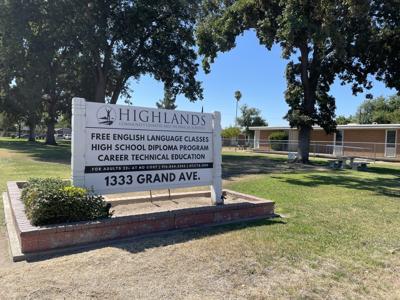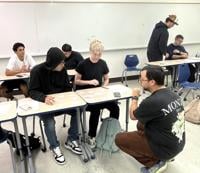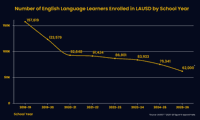
Highlands Community Charter and Technical Schools' main campus in Sacramento has grown from just a few buildings to a large campus with dozens of classrooms over the last decade. (Credit: Diana Lambert/EdSource)
This story was originally published by EdSource. Sign up for their daily newsletter.
Highlands Community Charter and Technical Schools opened in Sacramento in 2014 with high ideals — to help adult students, many formerly incarcerated or new immigrants, to earn a diploma, improve English language skills, or learn a trade.
Now, the school is one reason state legislators are considering increased charter school oversight.
The charter school has been the subject of investigations and critical news reports since shortly after it opened its first campus. But, instead of increased oversight, the school was allowed to expand to more than 50 sites with 13,700 students and a budget of $195 million.
It wasn’t until the California State Auditor’s Office released a report in June, commissioned by state legislators, that the level of impropriety at the school became apparent.
The 80-page state audit found that the adult school received $180 million of K-12 funding for which it was not eligible, assigned teachers to classes they were not credentialed to teach, and avoided standardized testing by eliminating the 11th grade.
The audit also found that school leaders spent $1.96 million on a three-day trip for staff to San Diego for professional development, $80,000 on a leadership conference in Maui, $33,000 a month to lease a semi-professional ballpark, and more than $145,000 on gifts for students.
“The Highlands audit has underscored for us the need for greater accountability on the part of charter authorizers of all sizes, to conduct more thorough oversight that is not solely reliant upon a charter school’s annual audit or a charter school’s assertions,” said Cassie Mancini, legislative advocate for the California School Employees Association at a state Senate hearing on Assembly Bill 84, a charter oversight bill, in July.
Legislators, charter school advocates and charter school authorizers have been working to revise two competing charter school bills with the goal of merging them into one.
Adult charter gets K-12 funds
Many of the problems the audit found at Highlands Community Charter seem to stem from how the school leaders interpreted the rules around a unique federal program that allows adult charter schools, working in partnership with a Workforce Innovation and Opportunity Act agency, to receive K-12 funding, which is significantly higher than adult education funding.
K-12 funding comes with requirements that teachers have a K-12 credential, and that students attend class for a specific amount of time and make adequate academic progress.
Observers who visited the school found that teachers generally lectured for only two to three hours a day, and students arrived and left campus at will. The district also lacked verifiable documentation of attendance, according to the audit.
The school, which had many adult immigrant students, was also failing academically. Graduation rates at Highlands Community Charter were so low in 2023-24 that they brought down California’s graduation rate by more than half a percentage point, according to the California Department of Education.
Highlands Community Charter had a graduation rate of 2.8% and its California Innovative Career Academy, or CICA, had a rate of 16.9%. Highlands opened CICA, an independent study school, in 2019.
eachers had the wrong credentials
A large number of underqualified teachers and large class sizes, averaging 51 students per teacher, may have contributed to the poor academic performance of the school’s students, according to the audit. The state has no limit on class sizes in charter high schools.
At the time of the audit, only 53 of the school’s 250 teachers had a K-12 credential, said Bill McGuire, who served as executive director of the school during the year of the audit. He blamed the lack of appropriately credentialed teachers on inaccurate information from credentialing officials.
“For 10 years, Highlands and Twin Rivers were told this is an adult school and everybody needs to have adult school credentials,” McGuire said.
The California Commission on Teacher Credentialing advised Highlands charter leaders to work with its authorizer, the Twin Rivers Unified School District, to identify the appropriate credentials for its teachers, according to a statement the commission sent to EdSource.
The California Department of Education website confirms that the Highlands Community Charter is on record as a K-12 public school, and, as such, is required to have teachers with K-12 credentials, permits or waivers, according to the statement.
Because of these transgressions, the school will have to repay the $180 million it was overpaid, according to the audit. Charter leaders said that repaying that amount to the state would bankrupt it and force the closure of its school sites.
“This is not money sitting in someone’s bank account,” McGuire said. “All of these funds went to students, went to teachers, went to all of this.”
Plenty of blame to go around
Despite the laundry list of transgressions by the charter school, the audit also laid responsibility for the problems at Highlands Community Charter at the feet of Twin Rivers Unified, the California Department of Education and the Sacramento County Office of Education. It said the agencies did not take appropriate action after a 2018 Fiscal Crisis and Management Assistance Team (FCMAT) report revealed problems with the charter.
The FCMAT report found that Highlands Community Charter leaders engaged in questionable practices, including hiring staff convicted of violent felonies, using public money to educate students who were ineligible for services, and paying the legal fees and car repairs of school employees.
Myrna Castrejón, president and CEO of the California Charter Schools Association, calls the problems at Highlands Community Charter a systematic failure on all ends — authorizing, oversight and school leadership.
“(District leaders were) painting very broadly and very loosely in an area that is not well understood, and that was evolving faster than reactions could happen,” Castrejón said. “I think it’s not fair to deem this only as a bad actor charter, because I think Twin Rivers has a lot to be accountable for as well.”
Twin Rivers could have done more
As the charter school’s authorizer, Twin Rivers Unified collected $12.9 million in facility fees — 3% of Highlands’ K-12 funding — from the school to provide oversight between the 2019-20 and the 2023-24 school years, according to the audit.
Questions raised by the FCMAT report didn’t keep Twin Rivers Unified from giving conditional approval in 2019 to the California Innovative Career Academy.
“If Twin Rivers had conducted more thorough oversight, it could have identified some of the violations we identified as part of our audit and taken action to address them earlier,” said California state auditor Grant Parks in the audit.
Twin Rivers Unified conducted only minimal annual oversight and relied too heavily on the charter school’s annual audits — some with inaccuracies — performed by a CPA, according to the audit.
California state law requires school districts and other authorizers to ensure staff visit each of their charters at least annually, provide a district staff member to be a contact person for the school, ensure its charter schools file all legally required reports, monitor each school’s fiscal condition and notify the California Department of Education if the school’s charter is revoked, or it closes for any reason.
“TRUSD maintains that it met existing law and remains committed to continuous improvement,” said school district officials in a statement sent to EdSource. “TRUSD has and will continue to strengthen oversight procedures, has retained outside experts, and taken proactive steps to ensure even greater transparency and accountability of charter schools moving forward.”
District, charter had cozy relationship
Highlands Community Charter has had a questionably close relationship with Twin Rivers Unified, with the district and charter even sharing a board member for a time.
Linda Fowler, a Twin Rivers Unified school board member, was one of the founders of Highlands Community Charter. She sat on its board as a representative of the school district until her newly opened consulting company, LAED Consulting, was given a five-year $390,000 contract by her fellow board members.
“I’ve gone above and beyond the call of duty,” Fowler told a reporter at the time. “Why should I work for free when it isn’t against the law?”
The contract was later rescinded after the school’s principal questioned its appropriateness, but not before the company was paid $13,000.
The state Fair Political Practices Commission fined Fowler $3,500 in 2019, saying she violated federal conflict-of-interest laws by influencing board members to approve the contract with her company.
When the charter was audited by the state, its leaders hired Twin Rivers Unified’s former deputy superintendent, Bill McGuire, first as a consultant and then to be the school’s executive director. McGuire left the district in 2019.
In their response to the audit, the Sacramento County Office of Education and Twin Rivers Unified officials said they offered as much oversight as their authority allowed.
The California Department of Education’s response stated that officials there would continue to monitor Highlands’ finances and would propose changes to audit guidelines that would ensure charter schools are in compliance with testing requirements.
If you look at the actual language in the law, I think Twin Rivers Unified and the Sacramento County Office of Education leaders were correct in saying they did all that was legally required of them in regard to oversight, but they could have done more, said David Patterson, president of the California Charter Authorizing Professionals, a nonprofit dedicated to improving charter school authorization and oversight.
“There was failure in every step, where someone could have stopped this — starting with the (charter) school board and working your way up,” Patterson said.
Fallout from the audit was immediate
As a result of the state audit, many of the 700 employees at Highlands Community Charter and Technical Schools were laid off, and most of its smaller sites were shuttered because the schools lacked enough credentialed teachers to resume operations.
Only 1,900 of the school’s former 13,700 students were able to enroll this school year, according to the charter. More than 7,000 are on a waiting list.
“I don’t think the staff at Highlands, at the time, thought that they were doing something illegal,” said Eric Premack, executive director of the Charter Schools Development Center, whose membership includes Highlands Community Charter and Technical Schools. “My sense was they thought they were coloring inside the lines, although perhaps they realized they were coloring very close to the lines.”











(0) comments
Welcome to the discussion.
Log In
Keep it Clean. Please avoid obscene, vulgar, lewd, racist or sexually-oriented language.
PLEASE TURN OFF YOUR CAPS LOCK.
Don't Threaten. Threats of harming another person will not be tolerated.
Be Truthful. Don't knowingly lie about anyone or anything.
Be Nice. No racism, sexism or any sort of -ism that is degrading to another person.
Be Proactive. Use the 'Report' link on each comment to let us know of abusive posts.
Share with Us. We'd love to hear eyewitness accounts, the history behind an article.